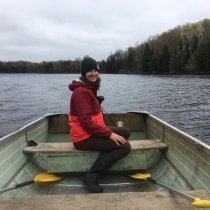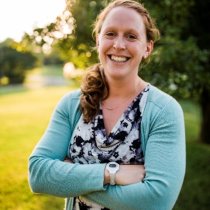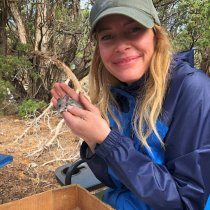Spotlight
Women in Ecology – Clara Qin
June 28, 2023
In our latest Women in Ecology interview – where we feature exceptional ecologists driving positive change – we hear from Clara Qin, a dedicated Ph.D. candidate from the University of California - Santa Cruz about how her personal experiences have shaped her motivations, aspirations, and transformative moments.
From her research on the impact of climate change on fungal communities to integrating human systems into ecological analyses, Qin bridges the gap between ecological knowledge and practical application. She also highlights the importance of embracing diverse perspectives and their significant impact on ecological research, and the pivotal role played by NEON in driving her research endeavors, providing valuable insights into the complex dynamics of our natural world.
Can you tell us about your career path? What inspired you to become involved in your current field?
As a child of immigrants, I initially felt societal pressure to pursue a career in medicine or law. Negotiating these pressures alongside my own intellectual interests, I completed my undergraduate studies at Stanford University with a major in biology.
At first, I delved into molecular and cellular biology. Although I found it interesting, I felt disconnected from the urgent environmental challenges of our time, particularly the climate crisis. Stanford's reputation for sustainability further influenced my decision to focus on the environmental field.
Through serendipity, I found myself in the lab of Dr. Kabir Peay, a fungal ecologist at Stanford. Intrigued by the significant role fungi play in carbon cycling, I became an undergraduate research assistant. It was during this time that I worked with Dr. Jennifer Bhatnagar, a postdoc at the time, who is now a professor. My experiences in the lab showed me the importance of studying biodiversity for its intrinsic value, rather than solely connecting it to climate change or carbon cycling.
Simultaneously, I became aware of how a single-minded focus on carbon emissions and sequestration can overshadow other essential narratives of climate change, such as its disproportionate impacts in the Global South and in marginalized communities. This resonated with my own experiences as a Chinese American, where I felt compelled to assimilate and conform to certain American narratives. These experiences deepened my interest in studying biodiversity and its complex relationships within ecological communities.
Consequently, I became committed to studying community ecology, a field within ecology that explores the assembly and dynamics of biological communities over time and space. I also pursued a coterminal degree halfway through my undergraduate studies, earning a Master's degree in statistics alongside my Bachelor's degree.
I am currently enrolled in an interdisciplinary environmental studies program at UC Santa Cruz, situated within the social sciences division. This arrangement provides me with the flexibility to ask ecological questions while also engaging with the social sciences. With the support of my advisor, Dr. Stacy Philpott, an agroecologist who bridges multiple disciplinary worlds, I am able to explore and address environmental challenges from multiple angles.
What keeps you motivated in your ongoing dedication to this field?
One aspect that particularly drives me is understanding the extent to which environmental issues can be explained and addressed through ecological terms. I am deeply passionate about delving into the intricacies of these issues and unraveling the ecological relationships that underpin them. This fascination with understanding the science behind environmental problems and their potential solutions keeps me motivated in my field.
Additionally, my involvement with Lavender Phoenix – a trans and queer Asian and Pacific Islander community organization in the San Francisco Bay Area – has connected me to the concerns of community members regarding climate change and the climate crisis. It is disheartening to observe that despite our efforts to build an intersectional approach to activism, there remains a disconnect between my community and the scientific community, which is regarded as the authority on these issues.
I believe it is important to ensure that marginalized communities have access to the scientific knowledge that informs our understanding of the climate crisis and its interlocking systems of oppression. At the same time, I also believe it is essential to decolonize expertise and recognize diverse forms of local and traditional ecological knowledge. By working in both directions, I hope to contribute to a more inclusive and informed approach to environmental activism and community building.
What work are you most proud of at this point in your career? What research are you currently working on?
I'm really proud of the work that I have been able to accomplish with the help of NEON. Recently, I coauthored a paper in Global Ecology and Biogeography along with my coauthors, Dr. Peter Pellitier, Dr. Michael Van Nuland, Dr. Kabir Peay, and Dr. Kai Zhu. The paper focuses on the sensitivity of fungal communities under climate change in the U.S. and Canada.
The research builds upon the analysis conducted by Dr. Brian Steidinger, a postdoctoral research fellow in Kabir's lab at Stanford, where I had previously worked as an undergraduate. Brian investigated the diversity of ectomycorrhizal fungi, which are fungi that associate with tree roots to acquire energy. He discovered that the response of ectomycorrhizal fungal diversity to climate change varies depending on the current climate at a given location. This finding is intriguing because it demonstrates that the degree of climate change is not always a good approximation of the degree of its impact on biological communities.

Qin holding a mushroom in the field. Photo credit: Clara Qin
To expand upon Brian's analysis, I combined the network of soil samples from Brian's research with the larger data set available through NEON. Whereas Brian focused on diversity, I focused on the community composition of soil fungi and developed a new methodological framework to quantify its climate sensitivity. Using this framework, I projected the metric of climate sensitivity into a climate space, revealing distinct hotspots of climate sensitivity across different biomes.
What I found particularly significant is that the fungal community composition in boreal forests is in a precarious state under climate change. Even with mild climate projections, there would be significant shifts in the composition of fungal communities in boreal forest soils. This would result in a substantial influx of warm-adapted species, altering the overall fungal community structure. This finding has dire implications for boreal climates, especially considering other studies that have predicted massive climate shifts in the boreal forest region.
What is the most fun part about being an ecologist?
Being an ecologist is an incredibly rewarding profession that offers both enjoyable and challenging aspects. Personally, I find the most fun part about being an ecologist is the opportunity to connect and collaborate with fellow ecologists. The sense of community within the field is truly remarkable. For example, I attended the Ecological Society of America's joint annual meeting with the Canadian Society of Ecology and Evolution in 2022, which was especially memorable and exciting. At the conference, I had the chance to present my research, and I was overwhelmed by the enthusiasm and support I received from the attendees.
Overall, the camaraderie among ecologists and the freedom to explore various analytical frameworks make the profession enjoyable and intellectually stimulating. The opportunity to attend conferences and connect with ecologists who share my values has offered me a chance to learn from others, share experiences, and contribute to the wider ecological community.
What challenges do women in the field of STEM face?
In discussing challenges faced by women in STEM, it's crucial to consider how womanhood intersects with other social identities. My mother's experience as an international Ph.D. student in the U.S. comes to mind. She confronted a racially-inflected form of misogyny in her geology program, particularly when she became pregnant with me. The perception that women, especially women of color, prioritize family over career was prevalent at that time, and it resulted in her being nudged out of the program. It's frustrating to realize that she was forced to choose between me and her Ph.D.
In addition to discrimination, minoritized scientists are more likely to be penalized for their efforts to make science more equitable. There's a tendency to frame these disadvantages as a personal choice – such as when the sole woman of color in a department feels pressured to serve on committees – which can be unfair. We need choices that value our contributions and address the needs of our communities. The notion that women and marginalized individuals are choosing not to pursue careers in STEM oversimplifies the issue.
For example, I've taught and mentored young queer people of color who leave the sciences because they feel it doesn't address their concrete struggles. The pressure to survive and the need for practical solutions feel disconnected from the abstract ways that scientists sometimes communicate about environmental issues like climate change. While grappling with this disconnect, I find myself experiencing guilt and recognizing that there may not be an easy resolution. It remains an ongoing dilemma.
What barriers do you think need to be removed to solve the biggest ecological issues, or are you confident that the scientific community will be able to solve the world's issues?
When it comes to answering ecological questions and addressing scientific challenges, I do have confidence in the scientific community's capabilities. However, I'm not entirely convinced that science alone can solve the world's most pressing environmental problems. These challenges extend beyond data and knowledge and delve into how we establish facts and shape beliefs.
Let me share a personal anecdote from my time as an undergrad. I kept a digital notebook titled "Just the Facts," where I collected information about climate change. I believed that by presenting these facts to climate deniers, scientists could single-handedly solve the climate crisis. However, my perspective changed after reading "Merchants of Doubt." This made me understand that the establishment and authority of facts are not solely determined by scientific evidence and that powerful entities are working to discredit scientific knowledge.
While I firmly believe in the power of science, I think we need to adopt a more comprehensive approach. Simply insisting on the validity of scientific findings or participating in marches for science is not enough. Consider the work of Bruno Latour, whose research on the stabilization of scientific facts sparked controversy and was initially denounced as being "anti-science." Later in his life, Latour collaborated with researchers at the Critical Zone Observatories to demonstrate rigorous practices employed to generate useful and reliable information about climate change. This approach seeks to communicate the scientific process, not just the end results, and emphasizes the importance of demonstrating how science is done, rather than merely conveying information.
What do you hope to do in your field in the future and what areas of research would you like to see more work or investment in the future and why?
I am passionate about uplifting and studying soil microbial communities and their entanglement with various environmental issues, such as climate change and agricultural sustainability. Microbial ecology continues to offer study systems and analytical frameworks that I find enjoyable and engaging. For the same reasons, I am increasingly interested in agroecology and phytopathology.
As I progress in my field, I am eager to explore how ecological research can expand its focus on human systems and agricultural contexts that have historically been overlooked in ecological analyses. The traditional dichotomy between nature and culture has limited our understanding of complex socio-ecological interactions. However, given the pervasive influence of human activities, it is essential to acknowledge that everything has been impacted by human influence, particularly due to global, anthropogenic climate change. I envision the future of ecology being directed towards interdisciplinary approaches, allowing us to address the complex realities of our rapidly changing world.


